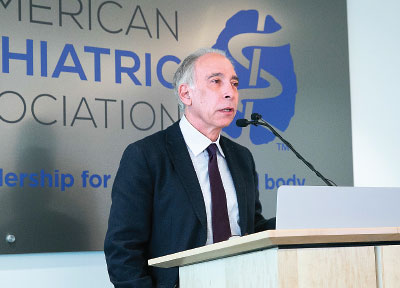Board Approves Statement Against Separation of Migrant Children
Abstract
Addressing the plight of migrant children was just one of many actions taken by APA’s Board of Trustees at its December meeting.
No child should be forcibly separated from parents or caregivers as a consequence of the federal government’s immigration policies, declared APA’s Board of Trustees as it approved a position statement on the issue at last month’s Board meeting in Washington, D.C.

Ned Kalin, M.D., the new editor of the American Journal of Psychiatry, tells Trustees that he plans to invest great energy into how issues of the journal are put together—for instance, by grouping seemingly disparate studies into one issue and showing that they actually share genetic, molecular, neuroanatomical, or behavioral underpinnings.
APA had earlier this year issued statements and joined other medical organizations in condemning the practice of separating migrant children from parents, a practice undertaken as part of the Trump administration’s “zero tolerance” policy regarding immigration. The action followed the Assembly’s approval of the statement at its meeting a month earlier.
APA President Altha Stewart, M.D., referenced the death of a 7-year-old girl in comments before the vote. The girl, a migrant from Guatemala, was reported to have died of dehydration and shock after being taken into custody by American border patrol. “We need to be on the record speaking out against this policy,” Stewart said. “This atrocity must be stopped.”
The AMA approved similar policy at the Interim Meeting of the AMA House of Delegates (Psychiatric News, December 7, 2018).
The APA position states the following:
Children should not be forcibly separated from their parents or caregivers as a consequence of immigration policies. For children who undergo forcible separation, qualified health professionals should be available who can provide trauma-informed, culturally, linguistically, developmentally, and structurally competent care.
All children must have the right to live in a healthy environment free from violence and with access to evidence-based, trauma-informed, physical, and mental health care services.
Effective partnerships between APA and immigration agencies and affiliated relief and aid organizations should be developed to address gaps in providing trauma-informed, culturally, linguistically, developmentally, and structurally competent care for these children.
Immigration agencies should collaborate with medical societies and with key stakeholders to address gaps in providing trauma-informed, culturally, linguistically, developmentally, and structurally competent care for these children and their parents or caregivers.
There must be development of resources that promote best practices in prevention and early intervention for immigrant children and adolescents by making relevant screening instruments and other resources publicly available.
The Board also approved a resolution condemning “the brutal treatment of black males, the use of excessive force against black males, and the use of unwarranted and unnecessary deadly force against black males by law enforcement agencies and police departments.”
The position statement encourages initiatives that foster direct collaboration between law enforcement and black communities “in order to engender trust, cooperation, and understanding.”
Additionally, APA encourages the development of novel approaches and strategies to address the unique mental health needs of black males who have either directly or indirectly experienced police brutality and/or the use of unwarranted excessive/deadly force by law enforcement, as well as the mental health needs of their families and community members.
APA Joins Coalition Against Gun Violence
Additionally, the Board officially accepted an invitation to join the medical consortium of the American Foundation for Firearm Injury Reduction in Medicine (AFFIRM). APA joins a number of other organizations participating in the consortium including, among others, the AMA, American College of Physicians, American Academy of Pediatrics, American College of Emergency Physicians, and American College of Surgeons.
AFFIRM’s mission is to eliminate the epidemic of gun violence through research, innovation, and evidence-based practice. The group will raise money privately to fund research on gun violence as a public health problem. Since 1996, congressional spending appropriations bills have prohibited funds allocated to the Centers for Disease Control and Prevention from being used for research on gun violence as a public health problem. While Congress clarified in an omnibus continuing resolution last March that the CDC can conduct research on gun violence, it also stated that government funds cannot be used.
AFFIRM takes no position on an individual’s right to firearm ownership and eschews a policy agenda. According to the organization’s website, AFFIRM’s goals are the following:
Raise research funds among diverse private-sector financial resources.
Create infrastructure with expert leadership. The organization will identify and score health and research priorities and select project proposals to address the highest-ranking health priorities in this field.
Provide funds to qualified researchers through their respective academic and/or professional medical organization, and through an open and competitive process.
Sponsor professional working groups for the development of best practice recommendations, related educational resources, and training curricula with evidence derived from completed research.
Cooperate with academic and professional medical standards organizations to integrate research evidence into medical education and health practices. Conduct quality assurance of completed research and educational materials.
Other Actions
In other news, trustees accepted the report of the IPS Strategic Planning Work Group, a group looking at various proposals affecting the future of APA’s fall meeting focused on public psychiatry. The Board voted to request that the APA administration work with the current IPS work group to examine the feasibility of a revised format for future IPS meetings and report back to the Board of Trustees in March. The Board also voted to suspend the 2020 meeting because there were some challenges with contracting with a hotel for the 2020 meeting. The 2019 IPS, which will be co-branded with the World Psychiatric Association, will be held in New York City. ■
APA members may access archived summaries of Board actions here.
See also: Board Member Honored for Becoming Lifetime APA Member.



